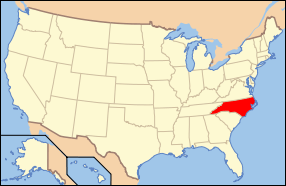Hezekiah Alexander House
|
Hezekiah Alexander House | |
|
Hezekiah Alexander stone house, 1936 | |
  | |
| Location | 3500 Shamrock Drive, Charlotte, North Carolina |
|---|---|
| Coordinates | 35°13′55″N 80°46′00″W / 35.23194°N 80.76667°WCoordinates: 35°13′55″N 80°46′00″W / 35.23194°N 80.76667°W |
| Area | 8.3 acres (3.4 ha) |
| Built | 1774 |
| NRHP Reference # | 70000461[1] |
| Added to NRHP | April 17, 1970 |
Hezekiah Alexander House in Charlotte, North Carolina, built in 1774, is the oldest house in Mecklenburg County, North Carolina. It was named to the National Register of Historic Places in 1970.
Hezekiah Alexander (1722–1801) bought more than 300 acres (121 ha) on Sugar Creek in 1767. He built a house for his family in 1774, and while he worked as a blacksmith and later a farmer, he served in the Fifth Provincial Congress which wrote North Carolina's first constitution, and as a trustee of Queens College[2] (which should not be confused with the present-day Queens University of Charlotte.)
The stone house has a style typical of those built by Germans who settled in Pennsylvania and by the Dutch in the Hudson Valley. Germans who moved south to North Carolina also built houses of this type. The Alexander House is one of the few examples of this architecture still in existence.[2][3]
In 1943, Eugene M. Cole donated what was called Rock House Place and its 180-acre farm to the Western North Carolina Annual Conference of the Methodist Church for a planned retirement community which became known as The Methodist Home.[4] In 1949, the Daughters of the American Revolution leased the house from The Methodist Home. The house was restored and a committee of DAR chapters let people tour the property. In 1969, the Hezekiah Alexander Home Foundation was formed, eventually raising $200,000 for restoration. However, the foundation could not complete the nearby reception center on its own.[5]
In 1975, the Charlotte city council put the home under the Mint Museum. The home site was called Mint Museum of History until November 1985, when the Mint Museum finished work on expansion that would allow all operations to move to Randolph Road. On October 13, 1986, the Mint Museum voted to go along with the city council's plan to move the museum to the city's parks and recreation department. This resulted from complaints that the Mint Museum lacked interest in history, but the change also would allow the Mint Museum to focus on fine arts rather than history.[6]
The foundation took over administration of the house and museum in 1990. The city required that $2 million be raised, and the foundation exceeded that amount by more than $1 million.[5]
Late in 1993, the Charlotte History Museum moved its archives and a 5000-piece historical collection, divided among many locations, into a 1500-square-foot addition to its 5000-square-foot building.[7]
In 1996, the foundation began work on a 36,000-square-foot building. With $7 million raised, the building officially opened October 24, 1999. In 2002, the foundation changed its name to Charlotte Museum of History, Inc.[5]
In 2013, the Charlotte Museum of History moved most of its operations to Levine Museum of the New South.[8]
The Charlotte Museum of History now protects the house as a historic house museum.
References
- ↑ National Park Service (2010-07-09). "National Register Information System". National Register of Historic Places. National Park Service.
- 1 2 "Hezekiah Alexander House". Charlotte-Mecklenburg Historic Landmarks Commission. Retrieved January 28, 2014.
- ↑ Raymond F. Pisney (March 1970). "Hezekiah Alexander House" (pdf). National Register of Historic Places - Nomination and Inventory. North Carolina State Historic Preservation Office. Retrieved 2015-02-01.
- ↑ "Our Story". Aldersgate. Retrieved January 30, 2014.
- 1 2 3 "Our History". Retrieved September 5, 2016.
- ↑ Maschal, Richard (October 14, 1986). "Mint Begins Separation from Alexander Homesite". The Charlotte Observer. p. 4B.
- ↑ Gubbins, Pat Borden (August 8, 1993). "Angels' Help Make More Room for History; Charlotte Museum's Growth Will Let It Exhibit, Store Archives". The Charlotte Observer. p. 2 of Mecklenburg Neighbors.
- ↑ Price, Mark (March 9, 2013). "History museum to give up its building: New director will take over the mostly shuttered Charlotte history center". The Charlotte Observer. p. 1B.
External links
- Carnegie Survey of the Architecture of the South (Library of Congress): Hezekiah Alexander stone house, Charlotte vic., Mecklenburg County, North Carolina
- Hezekiah Alexander House - Charlotte Museum of History
.jpg)

